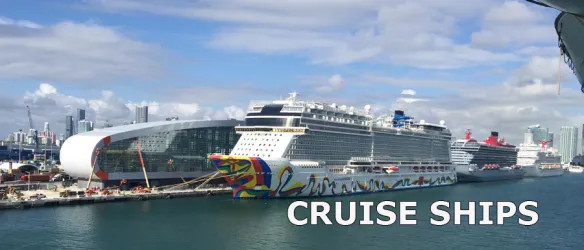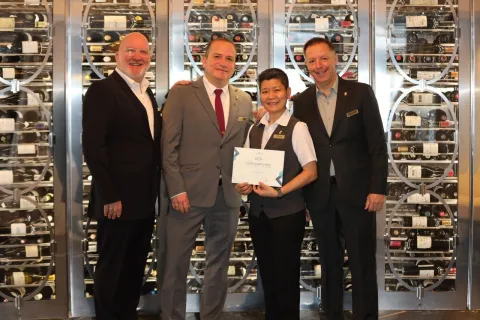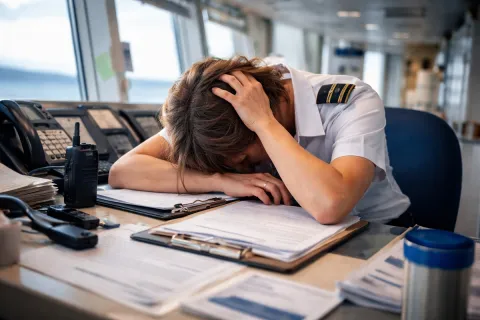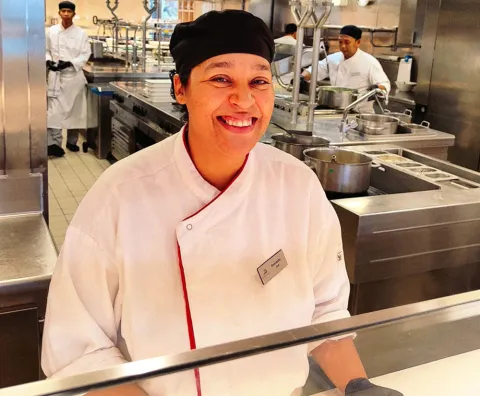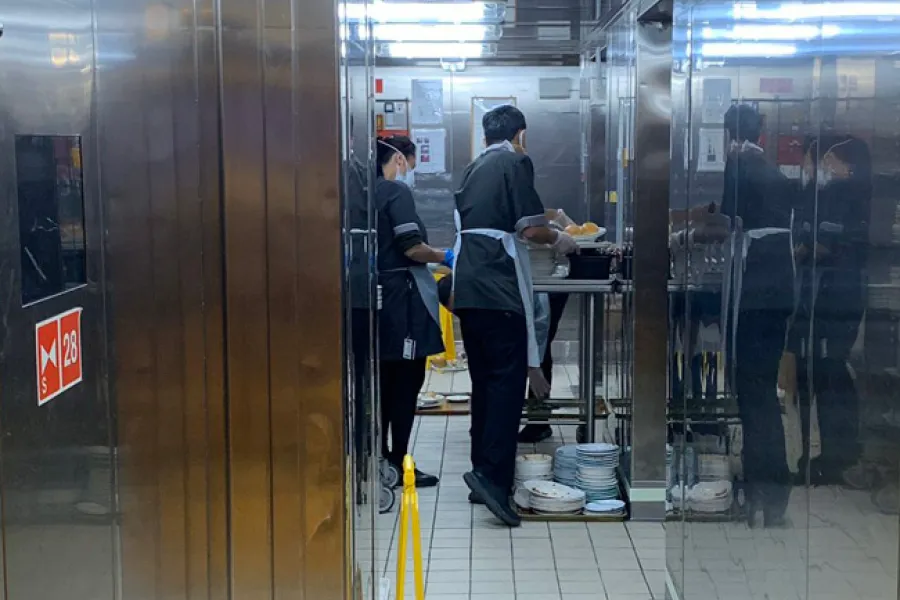
The world has been on its toes since the announcement of the rapid spread of the Coronavirus with its initial outbreak in Wuhan, China as the World Health Organization declared it a public health emergency. And while authorities have reported that the virus has killed approximately 1000 people and infected more than 40,000 since the outbreak, the cruise ship Diamond Princess ship has been quite the focus in the news as the numbers on the ship double as authorities announced additional 66 people infected totaling to 136 since the start of the quarantine.
While the numbers related to infected and the conditions of the guests are the main focus of the mainstream news media, one component is consistently disregarded the CREW.
The Diamond Princess was quarantined on February 04, 2020 in Yokohama, Japan for 14 days per Japanese authorities upon reports of infected people aboard. As the ship entered day 6 into the quarantine period the Japanese Ministry of Health informed that "the results from 103 people have now come out and 65 of them are confirmed positive for the new coronavirus." Crew Center received information after that release as the Captain announced 66 new cases of confirmed infected which brings the numbers to 136. The majority of the newly reported cases are predominately individuals from Japan, but there are also some Australians, Filipinos, Ukrainian, Canadian and British.
The ship has a total of 3,711 people currently onboard (2,666 guests and 1,045 crew) with reportedly less than 10% of them screened and tested for the virus only after self-reporting or presenting with symptoms. However, with the reported number of 136 infected this constitutes approximately half of the tested which tells us that the virus poses a serious threat. And this is understandable as the expectation of the crew members who are hospitality professionals to undertake the responsibility of a quarantine for which medical professionals, providers, technicians, cleaners, etc. are specially educated and trained in infectious diseases, prevention, and rapid intervention is nothing short than absurd and nonsensical. While the crew members receive preliminary training in the quarantine of the Norovirus which is a virus that can occur in enclosed spaces such as ships, the magnitude, and risks of the coronavirus are not on par. Furthermore, the expectation of the limited medical providers onboard a cruise ship hired by the cruise company to tend to such magnitude poses ethical and liability concern for any medical provider.
The whole world has seen the banner written by a passenger in Japanese initially when the ship was quarantined informing that they are low on medications. We have read and heard the complaints from passengers that the conditions are inhumane and unsanitary as they are not receiving stateroom services, having to recycle garments and being unable to leave their staterooms in order to reduce risk of spreading the virus, as well as their fear of contracting the virus.
All this has been well covered in the media. But there is another side to the story, the one that generally is either not covered or under-covered and that is the crew and staff.
Crew Center received messages from crew members on board the ship with fear for their health and lives, as well as related to the conditions and concerns of performing duties that should be managed, performed, or even overseen by more appropriate professionals and authorities. Crew members have informed us that they have received responsibilities to bring food to the guests cabins, as well as take the dirty trays back to the pantry and in the galley for clean up. Furthermore, they take the dirty linen placed outside the staterooms to be washed and placed back in front of the doors of the guests. And we all remember the beloved three bucket system. Well, if on normal cruise day we all called it nightmare from hell, on a quarantined ship appears to be 24/7. And while these are just some of the responsibilities or the crew members at this time, lets touch base on the actual concerns of the crew members because hard work definitely is not it.
Crew members have informed that they are being provided masks and gloves, as well as consistently reminded to wash hands. However, unlike the guests who are able to receive their food in their staterooms, crew members continue to be provided food off of the buffet-style lines where mass numbers of crew members eat. Sure, there is appointed person who assures that each person who enters the crew mess washes their hands before eating. However, the feeding is conducted in the crew mess where the members have to take their masks to eat. As crew members, we all know the three bucket systems and other sanitization chemicals and surely at this time members of the Diamond Princess are probably sick and tired of sanitizing. Yet, the risk is still out there.
Crew members are not allowed to congregate in crew bars at this point to prevent spread, but congregation to conduct business, as usual, is nothing short of a must onboard a cruise ship as even at reduced rate of entertaining guests, teamwork makes a dream work is still a motto. Cruise ships are nothing short of well-oiled machines where the crew members produce food, wash linen, and so on for 3600 people on a daily basis. This does not occur in a quarantined manner as those crew members have to communicate and congregate in order to be apart of that well-oiled machine that continues to function even if crew are fatigued and exhausted, as well as morale has plummeted with not being able to do anything that would relieve some level of stress.
While crew members most often spend 6-11 months aboard a cruise ship often with little sleep and are well versed in the language of stress, the normal level of stress as relate to working on a cruise ship usually does not come along with the hint of fear for own health, well-being, life and responsibility beyond the means, abilities and education/knowledge of a hospitality worker, as well as having to choose between health and future employment. Several crew members who have expressed the desire to end their contract and return home as they are not displaying any symptoms have been informed that they will not be offered renewal of contracts.
The contracts signed by the crew are of hospitality workers, not quarantine workers (which workers generally receive higher pay, better benefits, as well as something called a "hazard pay" due to the risk that they are knowingly entering).
Not one of the crew members aboard the Princess Diamond has accepted a contract as a quarantine or health service worker and none of them knowingly entered the risk that accompanies the coronavirus. Hence, with the novel risks and hazards that are not generally associated with hospitality work, requests for leave should not be perceived as an early termination of contract unless an amendment to the pay with the consideration to the novel circumstances and contract is done. If the circumstances of responsibility changes (i.e., serving guests as a hospitality worker versus serving potential or actual patients as a hospital/quarantine worker) would the contract by default be null and void? The expectation that any person does more work or more dangerous work without appropriate agreement and arrangements when originally informed of less work and lower-level threats would be nothing short than an outrage if it occurred on land. Nonetheless, addressing scared crew members with additional scare tactics might not be the best business practice, but maybe addressing their direct and individual concerns may be. When fear is met with more fear, people generally do not make the best decisions as they are focused on the increase of fear, feelings of helplessness and hopelessness. We encourage leaders aboard to utilize humanistic practice of listening to their concerns, addressing their concerns, and providing information as related to what the crew can do instead of consequences. Furthermore, reminding staff that they are doing an exceptional job in such hard circumstances is nothing short of positive reinforcement. Remember, your crew is just scared and they are seeking guidance, not threats.
This is a bad situation for the cruise company as well. This has to be acknowledged as the cruise company also is not in the virus business but in the hospitality business. At this time it has to be acknowledged that the cruise company and ship Captain are following restrictions, recommendations and guidelines the best they can with what they have. Which brings us to the questions of the Japanese government that posed the quarantine in the first place. Is it reasonable to pose a restriction without providing the professional expertise directly first hand as soon as the restriction occurs? In other words, if the Japanese government posed the restriction with knowledge that the majority of the guests are Japanese citizens does Japan have the responsibility to provide the necessary resources to reduce the risks of each and every person aboard the ship and assure the 14-day quarantine versus leave the people aboard the ship with question marks as related to when they will escape their newfound living hell? When we talk about resources, we refer to providing sanitary quarantine clothing such as hospital robes and garments to the guests who did not pack for extended stay, medication supply, single packed pre-made meals for both guests and crew, staff that is specialized in infection control prevention and intervention, as well as quarantine measures, hygiene kits, etc. In regards to the increase of numbers and potential of further spread, a response finally came in that on the 7th day of quarantine academic research teams made up of specialists in infectious disease prevention will enter the ship to investigate the environment to prevent the spread.
Is it reasonable by the Japanese authorities to wait 7 days for prevention responses and expect that a cruise company and crew members who are not trained in infectious control be kept in the responsibility of something that is obviously medical?
And while the cruise company is obviously losing significant revenue and experience even cost as related to this quarantine, the guests experience less than humane environment and circumstances. The crew are experiencing not only loss of gratuities, increase in work and responsibilities, and fear of direct exposure we would like to remind that extended enclosure in spaces such as cabins or ships with such circumstances, stress and fear can affect the effectiveness of the immune system and not to mention as we all have received that training as related to mass hysteria. Thus, keep in a positive mindset, take extra precautions, remember that you have a responsibility to assure your own health and remind others of the same, rest whenever possible, and try to make the best of each day as this shall end too.
Crew Insights
Articles and experiences shared by crew members working on cruise ship. Find out more about ship life at sea together with tips and advices for first time crew members and cruise oldtimers.



